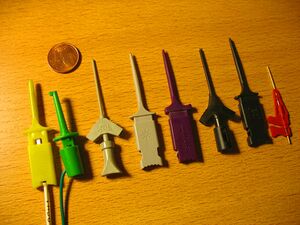Difference between revisions of "FAQ"
Uwe Hermann (talk | contribs) (Multimeters.) |
Uwe Hermann (talk | contribs) |
||
| Line 96: | Line 96: | ||
* [http://www.eevblog.com/2010/04/14/eevblog-75-digital-multimeter-buying-guide/ EEVblog: #75 – Digital Multimeter Buying Guide] | * [http://www.eevblog.com/2010/04/14/eevblog-75-digital-multimeter-buying-guide/ EEVblog: #75 – Digital Multimeter Buying Guide] | ||
* [https://www.youtube.com/playlist?list=PL4F0B97C59B1D2509&feature=plcp Youtube: EEVblog: Multimeter Reviews] | * [https://www.youtube.com/playlist?list=PL4F0B97C59B1D2509&feature=plcp Youtube: EEVblog: Multimeter Reviews] | ||
Some information about [https://en.wikipedia.org/wiki/Multimeter#Safety multimeter safety] and the IEC61010 categories: | |||
* [http://www.electroline.com.au/articles/26521-The-ABCs-of-multimeter-safety ElectronicsOnline: The ABCs of multimeter safety] (seems to be adapted from [http://support.fluke.com/SW-Common/SW-Find_It.asp this Fluke PDF]) | |||
* [http://www.fluke.com/fluke/usen/training/safety/default.htm Fluke: Electrical Measurement Safety Program] (various articles) | |||
Revision as of 19:00, 18 June 2012
General sigrok questions
What is sigrok?
sigrok is a portable, cross-platform, Free/Libre/Open-Source logic analyzer software that supports various logic analyzer hardware products. It is licensed under the terms of the GNU GPL.
What does the name sigrok mean?
sigrok is a logic analyzer software that groks signals for you.
What is the correct spelling of the name?
The name is spelled sigrok (yes, a lower-case "s", even at the beginning of sentences). It is not spelled "sigrock".
Is my logic analyzer supported?
Check the Supported hardware page for a list of supported logic analyzers, and those that are currently being worked on. Also, each device has its own wiki page, which lists the details of the hardware support for the respective device.
Will you add support for the XYZ logic analyzer?
Maybe. We generally try to support as much hardware as possible. However, as there are really many devices out there, this is of course a non-trivial task. We only have limited spare time, and a limited amount of money, too. Thus, naturally, we're happy about both code contributions as well as hardware donations (contact Bert Vermeulen and Uwe Hermann if you want to help out).
Do you build/sell/design logic analyzers?
No. The sigrok project is a pure (open-source) software project. We're not designing, building, or selling hardware. We only add software support for already existing logic analyzer hardware.
Which logic analyzer do you recommend buying?
We generally don't make any buying recommendations. There are many, many logic analyzers from different companies, with highly different capabilities and features out there, in price ranges from $60 up to $5000 or more. It all depends on your specific needs and preferences, and on the amount of money you are willing to spend.
However, as a small starting point for your own research in order to find a device which fits your need, we provide a Logic Analyzer Comparison table which lists some (but not all) relevant data points which you may want to compare.
Logic analyzer questions
What is a logic analyzer?
A logic analyzer is a device which can display and/or analyze the state of one or more signals of a circuit or target device. For a quick introduction see also the respective Wikipedia page, but make sure to read some of the documents from this entry for more details.
Where can I read more about logic analyzers?
Here is a list of recommended readings on various topics related to logic analyzers.
Note: Some of the Agilent/Tektronix documents are geared towards higher-end/expensive standalone logic analyzers, i.e. not the usual USB-based ones supported by sigrok. Thus, some of the information in those documents may not necessarily be relevant or important for most people. They do also provide lots of generally useful information, though, so reading them is recommended.
Introduction to logic analyzers:
- Tektronix: The XYZs of Logic Analyzers (PDF)
- EE Times/Agilent: A "How To" tutorial on logic analyzer basics for digital design
- Agilent: Application Note 1337: Feeling Comfortable with Logic Analyzers (PDF)
Samplerate, bandwidth, timing issues:
- EE Times/Agilent: How Much Bandwidth Does Your Logic Analyzer Need?
- Tektronix: The Importance of Timing Accuracy in a Logic Analyzer (PDF)
- Agilent: Application Note 1582: Logic Analyzer Specifications: How Much Timing Speed Do You Need? (PDF)
- Agilent: Reliable State Measurements on High Speed Buses (PDF)
- Tektronix: Fundamentals of Signal Integrity Primer (PDF, you need to provide some info before download)
Comparing or buying logic analyzers:
- Agilent: Application Note 1589: Evaluating Logic Analyzers Objectively (PDF)
- Janatek: F.A.Q: What to consider before buying a logic analyzer
Triggers:
Probing issues:
- Agilent: Application Note 1501: 6 Tips for Successful Logic Analyzer Probing (PDF)
- Agilent: Application Note 1450: Logic Analyzer Probing Techniques for High-Speed Digital Systems (PDF)
Other:
- Agilent: Application Notes: Logic Analyzer (list of documents)
- Tektronix: Logic Analyzer Tutorials (list of documents)
What kind of logic analyzer probes are available?
There are many logic analyzer probes of varying quality and price on the market (see photo for a small subset).
See Probe comparison for more information about the usefulness and quality of various probe types, where to buy them, and so on.
Multimeter questions
What is a multimeter?
A multimeter or digital multimeter (DMM) or Volt-Ohm meter (VOM) is a measurement device which can measure multiple things (such as voltage, current, resistance, temperature, and others). We won't go into all the details here, see the multimeter page on Wikipedia for more information.
Some good video tutorials on multimeters are (though there are many others, just search on Youtube and similar sites):
- Youtube: Afrotechmods: THE BEST Multimeter tutorial (HD)
- EEVblog: #26 – Multimeter Counts, Accuracy, Resolution & Calibration
- EEVblog: #75 – Digital Multimeter Buying Guide
- Youtube: EEVblog: Multimeter Reviews
Some information about multimeter safety and the IEC61010 categories:
- ElectronicsOnline: The ABCs of multimeter safety (seems to be adapted from this Fluke PDF)
- Fluke: Electrical Measurement Safety Program (various articles)
